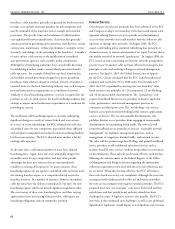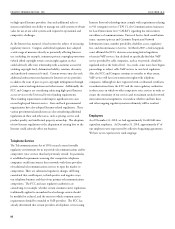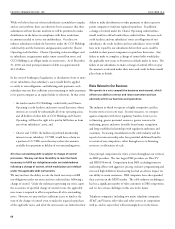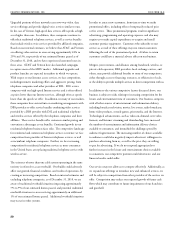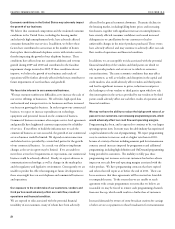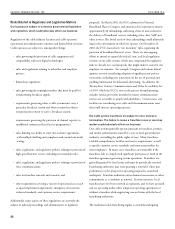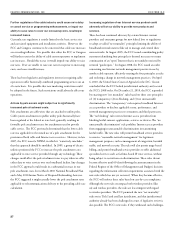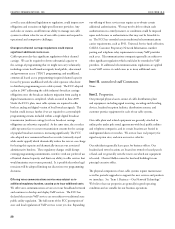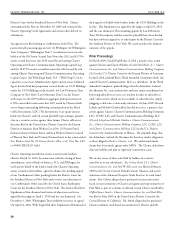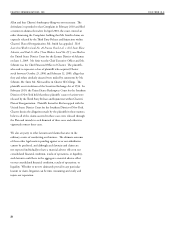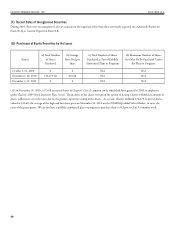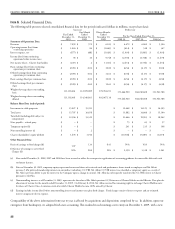Charter 2010 Annual Report Download - page 38
Download and view the complete annual report
Please find page 38 of the 2010 Charter annual report below. You can navigate through the pages in the report by either clicking on the pages listed below, or by using the keyword search tool below to find specific information within the annual report.
Our business is subject to extensive governmental legislation
and regulation, which could adversely affect our business.
Regulation of the cable industry has increased cable operators'
operational and administrative expenses and limited their revenues.
Cable operators are subject to, among other things:
rules governing the provision of cable equipment and
compatibility with new digital technologies;
rules and regulations relating to subscriber and employee
privacy;
limited rate regulation;
rules governing the copyright royalties that must be paid for
retransmitting broadcast signals;
requirements governing when a cable system must carry a
particular broadcast station and when it must first obtain
retransmission consent to carry a broadcast station;
requirements governing the provision of channel capacity to
unaffiliated commercial leased access programmers;
r ules limiting our ability to enter into exclusive agreements
with multiple dwelling unit complexes and control our inside
wiring;
rules, regulations, and regulatory policies relating to provision of
high-speed Internet service, including net neutrality rules;
rules, regulations, and regulatory policies relating to provision of
voice communications;
rules for franchise renewals and transfers; and
other requirements covering a variety of operational areas such
as equal employment opportunity, emergency alert systems,
technical standards, and customer service requirements.
Additionally, many aspects of these regulations are currently the
subject of judicial proceedings and administrative or legislative
•
•
•
•
•
•
•
•
•
•
•
proposals. In March 2010, the FCC submitted its National
Broadband Plan to Congress and announced its intention to initiate
approximately 40 rulemakings addressing a host of issues related to
the delivery of broadband services, including video, data, VoIP and
other services. e broad reach of these rulemakings could ultimately
impact the environment in which we operate. On December 21,
2010, the FCC enacted new “net neutrality” rules, regulating the
provision of broadband Internet access. ere are also ongoing
efforts to amend or expand the federal, state, and local regulation
of some of our cable systems, which may compound the regulatory
risks we already face, and proposals that might make it easier for our
employees to unionize. For example, Congress and various federal
agencies are now considering adoption of significant new privacy
restrictions, including new restrictions on the use of personal and
profiling information for behavioral advertising. In addition, the
Twenty-First Century Communications and Video Accessibility Act
of 2010, which the FCC is now in the process of implementing,
includes various provisions intended to ensure communications
services are accessible to people with disabilities. Certain states and
localities are considering new cable and telecommunications taxes
that could increase operating expenses.
Our cable system franchises are subject to non-renewal or
termination. The failure to renew a franchise in one or more key
markets could adversely affect our business.
Our cable systems generally operate pursuant to franchises, permits,
and similar authorizations issued by a state or local governmental
authority controlling the public rights-of-way. Many franchises
establish comprehensive facilities and service requirements, as well
as specific customer service standards and monetary penalties for
non-compliance. In many cases, franchises are terminable if the
franchisee fails to comply with significant provisions set forth in the
franchise agreement governing system operations. Franchises are
generally granted for fixed terms and must be periodically renewed.
Franchising authorities may resist granting a renewal if either past
performance or the prospective operating proposal is considered
inadequate. Franchise authorities often demand concessions or other
commitments as a condition to renewal. In some instances, local
franchises have not been renewed at expiration, and we have operated
and are operating under either temporary operating agreements or
without a franchise while negotiating renewal terms with the local
franchising authorities.
e traditional cable franchising regime is currently undergoing


